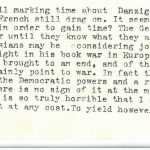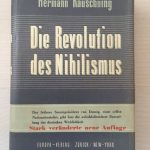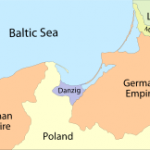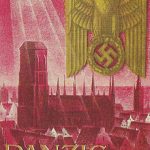This entry focuses primarily on Hermann Rauschning, the author of Graham’s latest read which warns of the dangers posed by Hitler and the Nazi party.
Rauschning (1887-1982) was a German conservative revolutionary who after initially embracing the Nazi party, renounced his membership in 1934, and went on to openly criticise Hitler and the party’s policies. The book to which Graham is referring is “Germany’s Revolution of Destruction” (1939), but he is most well-known for his following output titled “Hitler Speaks: A Series of Political Conversations with Adolf Hitler on his Real Aims”. The authenticity of these conversations, which were claimed to have taken place between 1932 and 1934, have been debated since.
Graham also mentions the ongoing problem of The Free City of Danzig, which Hitler had demanded the return of to Germany previously. Earlier in the month, British Prime Minister Neville Chamberlain had reaffirmed his support for Poland, reiterating that Britain did not view the issue as just an internal one between Germany and Poland, and would intervene if hostilities broke out.
The Free City of Danzig was a semi-autonomous city-state, which was a result of one of the many terms of the Treaty of Versailles. Danzig (present day Gdansk, Poland) and surrounding areas was created to provide Poland with access to a well-sized seaport, despite the population there being almost completely German. By the mid 1930s, agitation had increased substantially for Danzig to rejoin the rest of Germany, and after the invasion of Poland in September 1939, this indeed happened with the state abolished by the Nazi’s and the area incorporated into Danzig-West Prussia. In August 1945, the city officially became part of Poland through a stipulation of the Potsdam Agreement.
The aforementioned politician and author Rauschning was President of the Senate of Danzig between 1933 and 1934. Settling in the area after seeing combat as a lieutenant in World War One, he became active in the community and believed that Danzig should be returned to Germany, which was one of his main motivations for joining the Nazi party as he believed they could deliver this. Rauschning was not a typical party member in that he did not share their anti-semitic views, and he clashed with future Gauleiters of Danzig, such as Albert Forster who was instrumental in the “ethnic cleansing” of thousands of individuals in the area. After his resignation and public support of “constitutionalist” candidates against the Nazi’s and co-operation with the Poles in 1935, he fled throughout Europe before settling in Portland, Oregon to avoid living in fear of retribution.
To conclude this entry, Thomas ponders the fact that the Germans “have been rather ominously quiet recently” and his suspicions that are raised by this, momentarily worried about the possibility of Hitler just waiting for the world to “fall into his hand like a ripe plum” and for his adversaries to oblige. More realistically though, he knows that war is coming and will be one which he believes will be “incomparably more ghastly” than the last.
Sources used:
www.wikipedia.org





